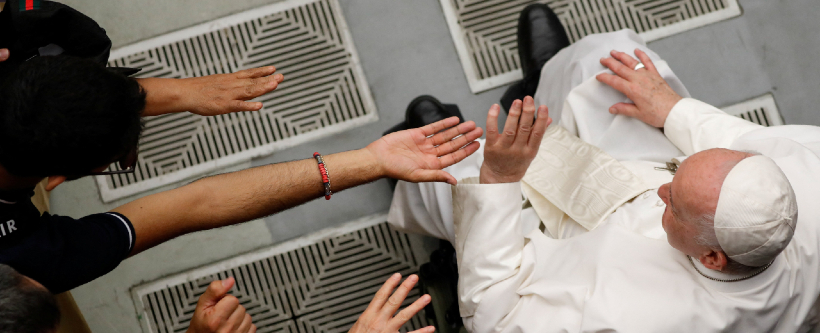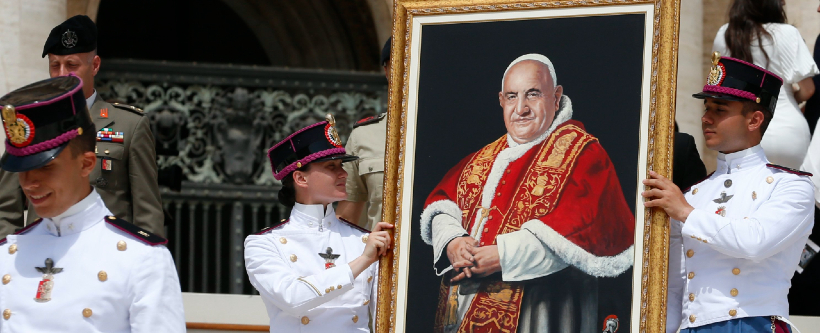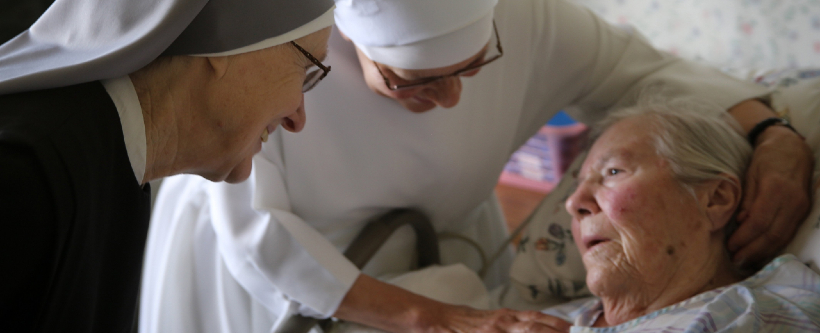
In the last meditation we reflected on the important promises that parents make to their children, when they were thought of in love and conceived in the womb.
We can add that, looking at it well, the whole family reality is founded on a promise: think about this well: the family identity is founded on a promise. It can be said that the family lives from the promise of love and fidelity that the man and woman make to one another. This implies the commitment to receive and educate the children, but it is also carried out in taking care of elderly parents, in protecting and helping the weakest members of the family, in helping one another to fulfil one’s qualities and to accept one’s limitations.
And the conjugal promise extends to sharing the joys and sufferings of all fathers, mothers and children, in generous openness to all that is related to human coexistence and the common good. A family that is shut-in on itself is a contradiction, a mortification of the promise that made it be born and that makes it live. Never forget the identity of the family; it is always a promise that extends and is extended to the whole family and also to the whole of humanity.
In our days, the honoring of fidelity to the promise of family life is very weakened. On one hand, by a misunderstood right to seek one’s own satisfaction, at all cost and in any relationship. It is exalted as a non-negotiable principle of freedom. On the other hand, because they rely exclusively on the constrictions of the law in regard to the bonds of the life of relationship and of the commitment for the common good. However, in reality, no one wants to be loved only for his goods or out of obligation. Love, as well as friendship, owes its strength and beauty precisely to this fact: that it generates union without taking away freedom. Love is free; the promise of the family is free. And this is its beauty. Without freedom, there is no friendship; without freedom, there is no love; without freedom, there is no marriage. Therefore, freedom and fidelity are not opposed to one another, what is more, they support one another, both in personal as well as in social relations. In fact, let us think of the damages produced in the civilization of global communication by the inflation of kept promises in several fields and the indulgence for infidelity to the word given and to the commitments made.
Yes, dear brothers and sisters, fidelity is a promise of commitment that is self-fulfilling, growing in the free obedience to the word given. Fidelity is a trust that really “wants” to be shared, and a hope that “wants” to be cultivated together. And, speaking of fidelity, there comes to mind what our elderly, what are grandparents tell us about ‘those times when an agreement was made, a shaking of hands was sufficient, because there was fidelity in promises.’ And this, which is a social event, also has its origin in the family, in the shaking of hands of man and woman to go forward together their whole life. Fidelity to promises is truly a masterpiece of humanity! If we look at its daring beauty, we are frightened, but if we scorn its courageous tenacity, we are lost. No relation of love — no friendship, no way of loving, no happiness of the common good — reaches the height of our desire and our hope, if this miracle of the soul does not dwell in us. And I say “miracle,” because the strength and persuasion of fidelity, despite everything, never ends, delighting us and surprising us. The honoring of the word given, fidelity to the promise, cannot be bought and sold. They cannot be obliged by force nor can they be looked after without sacrifice.
No other school can teach the truth of love if the family does not do it. No law can impose the beauty and legacy of this treasure of human dignity, if the personal union between love and generation does not write it in our flesh.
Brothers and sisters, it is necessary to restore the social honor to fidelity of love, to restore social honor to fidelity of love. It is necessary to take away the secret nature of the daily miracle of millions of men and women that regenerate their family foundation, of which each society lives, without being able to guarantee it in any way. It is no accident that this principle of fidelity to the promise of love and generation is written in God’s creation as an everlasting blessing, to which the world is entrusted.
If Saint Paul can affirm that in the family union a decisive truth is mysteriously revealed also for the union of the Lord and of the Church, it means that the Church herself finds here a blessing to look after and of which one always learns, even before teaching it. Our fidelity to the promise is always entrusted to the grace and mercy of God. The love for the human family, in good and bad fortune, is a point of honor for the Church! May God grant us to be up to the measure of this promise.
And we pray for the Synod’s Fathers: may the Lord bless their work, carried out with creative fidelity, in the certainty that He, the first, the Lord, is faithful to his promises. Thank you.
Speaker:
I greet the English-speaking pilgrims and visitors taking part in today’s Audience, including those from England, Scotland, Ireland, Denmark, Norway, China, Indonesia, Japan, Malaysia, Canada and the United States of America. In a particular way I greet the participants in the meeting of the International Diaconate Center. God bless you all!






Facebook Comments